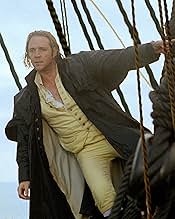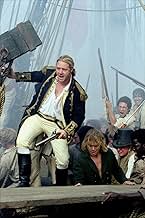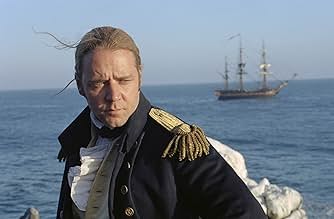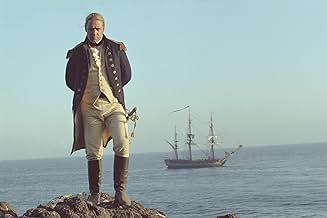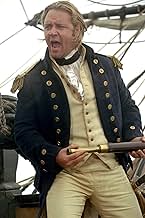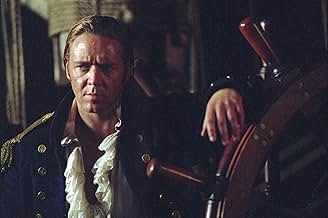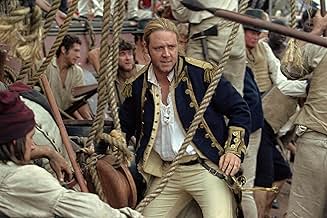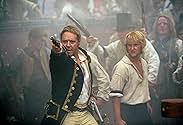दौरान नेपोलियन युद्ध, एक ब्रश ब्रिटिश कप्तान दक्षिण अमेरिका के चारों ओर एक दुर्जेय फ्रांसीसी युद्ध पोत की खोज में अपने जहाज और चालक दल को अपनी सीमा तक धकेल देता है।दौरान नेपोलियन युद्ध, एक ब्रश ब्रिटिश कप्तान दक्षिण अमेरिका के चारों ओर एक दुर्जेय फ्रांसीसी युद्ध पोत की खोज में अपने जहाज और चालक दल को अपनी सीमा तक धकेल देता है।दौरान नेपोलियन युद्ध, एक ब्रश ब्रिटिश कप्तान दक्षिण अमेरिका के चारों ओर एक दुर्जेय फ्रांसीसी युद्ध पोत की खोज में अपने जहाज और चालक दल को अपनी सीमा तक धकेल देता है।
- 2 ऑस्कर जीते
- 23 जीत और कुल 90 नामांकन
फ़ीचर्ड समीक्षाएं
There is a scene in MASTER AND COMMANDER: THE FAR SIDE OF THE WORLD where the captain of a British Naval ship, circa 1805, debates the difference between duty and passion. Having passed on an opportunity to make wonderful new discoveries in favor of the pursuit of a massive French war ship, the scene manages to make a rather eloquent, yet subtle comment on the nature of man and his place within the world. The beauty of this film is that there are many such moments where the viewer is simultaneously bombarded with thematic musings, exciting action sequences, great acting and historical accuracy to the point where it becomes difficult to take it all in at once.
Those of you looking for something more like Pirates of the Caribbean will be disappointed as this film is short on action and long on character development. There are only two major battle sequences, separated by more than an hour and a half of time. And while they are great; violently realistic and dramatically involving, the real guts of this film lies in the human stories told along the way. The director, Peter Weir, highlights his ability to tell an intimate story amidst a grand backdrop much like he did in The Truman Show. We get to know these men, their strengths and weaknesses and we see how the long and hard voyage plays on their minds over the film's progression. In one scene, a young officer feels the pressure of his men's dismissive stares and decides to end matters in his own way, afraid of what may be in store for him should he stick it out. Weir does a good job at highlighting the many facets of seafaring life.
If you're looking for an intelligent and thought-provoking journey into the life of a 19th Century British Naval Vessell, look no further. Master and Commander has the depth of a good Discovery Channel show and the action worthy of almost any other high-seas adventure that comes to mind.
Those of you looking for something more like Pirates of the Caribbean will be disappointed as this film is short on action and long on character development. There are only two major battle sequences, separated by more than an hour and a half of time. And while they are great; violently realistic and dramatically involving, the real guts of this film lies in the human stories told along the way. The director, Peter Weir, highlights his ability to tell an intimate story amidst a grand backdrop much like he did in The Truman Show. We get to know these men, their strengths and weaknesses and we see how the long and hard voyage plays on their minds over the film's progression. In one scene, a young officer feels the pressure of his men's dismissive stares and decides to end matters in his own way, afraid of what may be in store for him should he stick it out. Weir does a good job at highlighting the many facets of seafaring life.
If you're looking for an intelligent and thought-provoking journey into the life of a 19th Century British Naval Vessell, look no further. Master and Commander has the depth of a good Discovery Channel show and the action worthy of almost any other high-seas adventure that comes to mind.
In April 1805, Napoleon rules Europe. British frigate H.M.S. Surprise under the command of Captain Jack Aubrey (Russell Crowe) is ordered to intercept French Privateer Acheron. In the first battle, Aubrey quickly discovers that Acheron is actually bigger, faster and more powerful skippered by a smart tactician. He escapes only through his skills and experience. After being soundly beaten, Aubrey decides to keep going instead of returning to base to refit. The ship's surgeon and Aubrey's friend Dr. Stephen Maturin (Paul Bettany) clash with him more and more as the far ranging battle continues.
The action is exciting and more realistic than sail seafaring battle movies before it. The most compelling are the splinters that fly everywhere. It is the CGI that pushes the envelop on this action. Realism is everywhere. It is dirty, ugly, bloody, and horrifying. Russell Crowe delivers a solid performance to anchor this movie in reality. Then there are the everyday things that happen in between the battles. This has the epic scale conflicts but the human size struggle.
The action is exciting and more realistic than sail seafaring battle movies before it. The most compelling are the splinters that fly everywhere. It is the CGI that pushes the envelop on this action. Realism is everywhere. It is dirty, ugly, bloody, and horrifying. Russell Crowe delivers a solid performance to anchor this movie in reality. Then there are the everyday things that happen in between the battles. This has the epic scale conflicts but the human size struggle.
Normally, I do not begrudge someone their opinion about a movie, but when they cast aspersions about other reviewers here, I feel compelled to respond. One disgruntled reviewer of this film stated that she cannot understand how anyone could like this movie, let alone love it. Further, she claimed that we, the other reviewers, only believe what we are told to believe. Nothing could be further from the truth.
That someone would loathe what others have lauded is not surprising, really. I have to admit that I, too, have disliked films that were highly rated by a large majority of film critics. 'Fargo' comes to mind as does 'Moulin Rouge' and 'Mystic River.' However, unlike the reviewer, I watched these films several times over before reaching a final judgment in the event that I had been too hasty in my initial impressions. Neither of these films, though, were hailed as classics like 'MASTER AND COMMANDER'
Many people go into a theatre with a preconceived notion of what they think they will see, only to be disappointed when what they see is not what they expected. Each person carries with them their own set of experiences and no amount of explanation or arguments will change their mind, either. Yet, once in awhile a movie transcends the boundaries that define it, and its true genius is not something that everyone is going to apprehend. This is the case with 'MASTER AND COMMANDER'.
All I can say to that reviewer is simply, 'I am really sorry that you were not able to see what I saw.'
Movies like 'MASTER AND COMMANDER' only come around once in a generation. It is, without question, the finest movie ever made about tall ships. However, its greatness lies not in the story line but in those elements that typically ruin what would otherwise be great historical films, namely: dialogue, special effects, and sound track. Take for example, 'Gangs of New York.' The cinematography and sets were outstanding but the dialogue of everyone but Daniel Day-Lewis was severely lacking in historical authenticity. Another example is the 'Passion of the Christ' which used a mix of Aramaic and Hebrew to add its authentic feel, but it came across as highly artificial.
'MASTER AND COMMANDER' brought to life a language totally forgotten: the language of the sea, circa early 1800's. Every actor spoke the language as if they were born into it, and that element alone made the viewer feel as if they were viewing a window in time of a world rarely seen.
The sound editing alone was worth the price of admission. I have never been to a film where I actually felt that I was part of the environment. 'MASTER AND COMMANDER' did that, and even if you play the DVD on a plain TV, you would still marvel at the realism of the sound.
Finally, unlike every other sea movie that preceded it, the special effects were seamlessly integrated into the real footage of the ships at sea. At no time, did I get the sense that I was watching a scale model in a tank. In reality, the actual ship passed through rough seas on its journey around the Horn and these real scenes were added to the movie.
All these factors I mentioned above set the movie apart but that does not mean it had a substandard plot and mediocre acting. On the contrary, Russell Crowe was at his best playing Lucky Jack Aubrey with a panache that could only be matched by the late Errol Flynn. If I were a seaman aboard the HMS Surprise, I would truly feel that I could follow him anywhere. Crowe commands both the stage and the ship wherever he goes.
Paul Bettany as Jack's most trusted friend and the ship's doctor, turns in his best performance to date. Another unusual part of this movie is that while no seagoing fare would be complete without a love affair, the one in this movie is a platonic one between the captain and the doctor.
The two have a special relationship that is constantly strained by Crowe's call to duty and his overarching ambition. Having served with the great Lord Nelson, Lucky Jack does his best to emulate him and carve out a piece of British naval history for himself.
The film reminded me of works like 'Run Silent, Run Deep' which although dealt with more contemporary battles at sea (WWII), also featured a classic battle of wits between unseen adversaries. We never get to meet Jack's nemesis directly, but we learn by his battle tactics that he is a worthy opponent and a lot like Jack himself.
'MASTER AND COMMANDER' is a movie that I never tire of watching, and each time I see it I learn something new. It has its weaknesses like every movie does. It lacks continuity and subplots. It lacks character development of some of the more interesting supporting actors. Often I found it hard to keep track of who is who when everyone is referred to by their last names. Yet, all in all, 'MASTER AND COMMANDER' is a must-see movie and a must-own DVD.
That someone would loathe what others have lauded is not surprising, really. I have to admit that I, too, have disliked films that were highly rated by a large majority of film critics. 'Fargo' comes to mind as does 'Moulin Rouge' and 'Mystic River.' However, unlike the reviewer, I watched these films several times over before reaching a final judgment in the event that I had been too hasty in my initial impressions. Neither of these films, though, were hailed as classics like 'MASTER AND COMMANDER'
Many people go into a theatre with a preconceived notion of what they think they will see, only to be disappointed when what they see is not what they expected. Each person carries with them their own set of experiences and no amount of explanation or arguments will change their mind, either. Yet, once in awhile a movie transcends the boundaries that define it, and its true genius is not something that everyone is going to apprehend. This is the case with 'MASTER AND COMMANDER'.
All I can say to that reviewer is simply, 'I am really sorry that you were not able to see what I saw.'
Movies like 'MASTER AND COMMANDER' only come around once in a generation. It is, without question, the finest movie ever made about tall ships. However, its greatness lies not in the story line but in those elements that typically ruin what would otherwise be great historical films, namely: dialogue, special effects, and sound track. Take for example, 'Gangs of New York.' The cinematography and sets were outstanding but the dialogue of everyone but Daniel Day-Lewis was severely lacking in historical authenticity. Another example is the 'Passion of the Christ' which used a mix of Aramaic and Hebrew to add its authentic feel, but it came across as highly artificial.
'MASTER AND COMMANDER' brought to life a language totally forgotten: the language of the sea, circa early 1800's. Every actor spoke the language as if they were born into it, and that element alone made the viewer feel as if they were viewing a window in time of a world rarely seen.
The sound editing alone was worth the price of admission. I have never been to a film where I actually felt that I was part of the environment. 'MASTER AND COMMANDER' did that, and even if you play the DVD on a plain TV, you would still marvel at the realism of the sound.
Finally, unlike every other sea movie that preceded it, the special effects were seamlessly integrated into the real footage of the ships at sea. At no time, did I get the sense that I was watching a scale model in a tank. In reality, the actual ship passed through rough seas on its journey around the Horn and these real scenes were added to the movie.
All these factors I mentioned above set the movie apart but that does not mean it had a substandard plot and mediocre acting. On the contrary, Russell Crowe was at his best playing Lucky Jack Aubrey with a panache that could only be matched by the late Errol Flynn. If I were a seaman aboard the HMS Surprise, I would truly feel that I could follow him anywhere. Crowe commands both the stage and the ship wherever he goes.
Paul Bettany as Jack's most trusted friend and the ship's doctor, turns in his best performance to date. Another unusual part of this movie is that while no seagoing fare would be complete without a love affair, the one in this movie is a platonic one between the captain and the doctor.
The two have a special relationship that is constantly strained by Crowe's call to duty and his overarching ambition. Having served with the great Lord Nelson, Lucky Jack does his best to emulate him and carve out a piece of British naval history for himself.
The film reminded me of works like 'Run Silent, Run Deep' which although dealt with more contemporary battles at sea (WWII), also featured a classic battle of wits between unseen adversaries. We never get to meet Jack's nemesis directly, but we learn by his battle tactics that he is a worthy opponent and a lot like Jack himself.
'MASTER AND COMMANDER' is a movie that I never tire of watching, and each time I see it I learn something new. It has its weaknesses like every movie does. It lacks continuity and subplots. It lacks character development of some of the more interesting supporting actors. Often I found it hard to keep track of who is who when everyone is referred to by their last names. Yet, all in all, 'MASTER AND COMMANDER' is a must-see movie and a must-own DVD.
The British Navy ruled the waves throughout the nineteenth century and this film captures some of that spirit rather well. The cast is excellent, Crowe in particular shining as the captain. The battle scenes between Anglo-French vessels are very entertaining, the cannons blasting great big holes into enemy ships! The story itself is not going to set the world on fire, but its all done very nicely. The film offers a glimpse of what life at sea was like during the Napoleonic Wars and anybody with an interest in history should catch the film. A few more battles would have been nice, but there you go! It's over 2 hours long, but doesn't drag. One to watch definitely.
Epic. It is the first word defining it. But , scene by scene, the nuances are more significant. For a lot of reasons. The performances could be the first. And the most seductive. The memories about adventure and historical literature from. early years is the second. Not the last - the thrill of story, remembering huge drama. And the art of a real good adaptation.
क्या आपको पता है
- ट्रिवियाRussell Crowe learned to play violin for the film and referred to it as the hardest thing he'd ever done for a film.
- गूफ़During the Storm when the Surprise is chasing the Acheron around Cape Horn, Barrett Bonden is shown alone at the wheel. It was customary on a Royal Navy vessel of the time to always have at least two men at the wheel both as a security measure in case one man was injured in battle, and because the rudder itself was extremely heavy and difficult to turn. During any sort of heavy weather there would certainly have been four or more men at the wheel as one man would not be able to control the rudder (which is why the ship has two connected wheels).
- भाव
[Toasting]
Capt. Jack Aubrey: To wives and sweethearts.
Officers: To wives and sweethearts.
Capt. Jack Aubrey: May they never meet.
- क्रेज़ी क्रेडिटThere are no opening credits.
- कनेक्शनEdited into Spisok korabley (2008)
- साउंडट्रैकGhost of Time
Composed by Iva Davies, Christopher Gordon and Richard Tognetti
Performed by Iva Davies and Icehouse
Featured Violin Performance by Richard Tognetti
Orchestrated by Christopher Gordon
टॉप पसंद
रेटिंग देने के लिए साइन-इन करें और वैयक्तिकृत सुझावों के लिए वॉचलिस्ट करें
- How long is Master and Commander: The Far Side of the World?Alexa द्वारा संचालित
विवरण
- रिलीज़ की तारीख़
- कंट्री ऑफ़ ओरिजिन
- आधिकारिक साइटें
- भाषाएं
- इस रूप में भी जाना जाता है
- Capitán de mar y guerra: La costa más lejana del mundo
- फ़िल्माने की जगहें
- उत्पादन कंपनियां
- IMDbPro पर और कंपनी क्रेडिट देखें
बॉक्स ऑफ़िस
- बजट
- $15,00,00,000(अनुमानित)
- US और कनाडा में सकल
- $9,39,27,920
- US और कनाडा में पहले सप्ताह में कुल कमाई
- $2,51,05,990
- 16 नव॰ 2003
- दुनिया भर में सकल
- $21,16,22,535
- चलने की अवधि2 घंटे 18 मिनट
- रंग
- ध्वनि मिश्रण
- पक्ष अनुपात
- 2.39 : 1
इस पेज में योगदान दें
किसी बदलाव का सुझाव दें या अनुपलब्ध कॉन्टेंट जोड़ें

टॉप गैप
What was the official certification given to Master and Commander: The Far Side of the World (2003) in India?
जवाब






